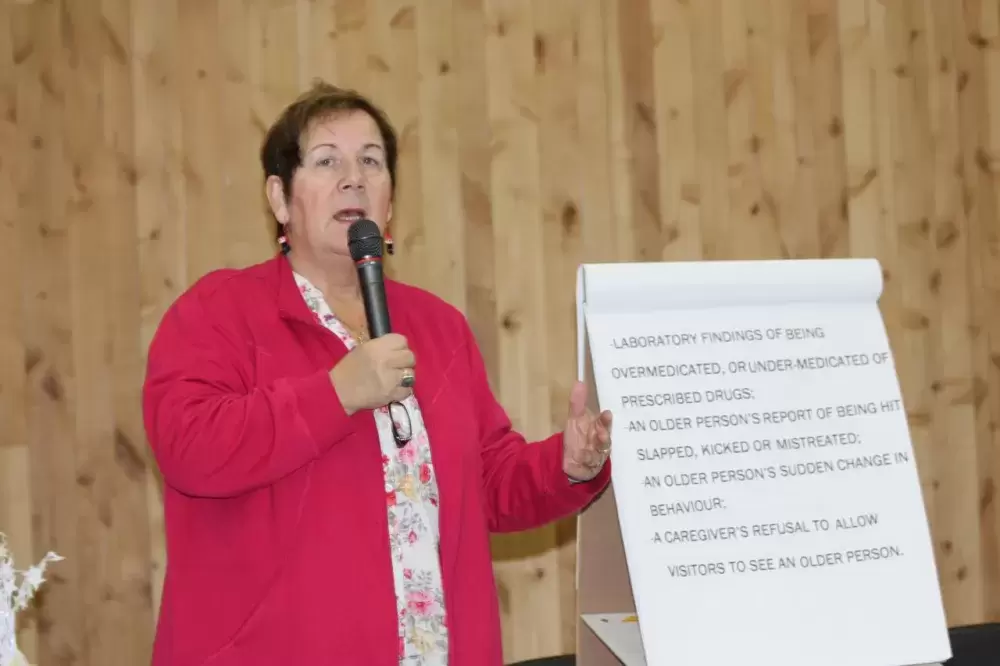Elder abuse can be any of several forms of maltreatment on an older person by someone who has a special relationship with them. That is how Donna Brown, Quu’asa Clinical Counsellor, defined elder abuse at the 20th annual Disability Access Committee wellness fair.
Brown went on to say that abusers can be a spouse, sibling, child, friend or even care-giver; anyone with a close connection to the elder.
There are many reasons people abuse. Brown said it could be about wanting power and control over another, it could be related to addictions or there may be mental health issues. “It could be ageism: some people believe that the older a person gets the dumber they are,” said Brown.
Elder abuse has many forms including physical violence, psychological abuse or even sexual abuse.
The more overt physical violence like hitting, kicking or rough handling - anything that causes physical pain - may leave wounds. Brown advised that people watch for signs of unexplained bruising or other injuries in the elders. There may be black eyes or bruising of the wrists or ankles showing that restraints have been used. She noted that as people age, their skin becomes thinner and blood vessels break more easily, so there may be a reasonable explanation for bruises.
According to Brown, nobody likes to talk about sexual abuse but it does happen, even to elders. Sadly, it can happen to seniors with dementia or Alzheimer’s disease, to the most vulnerable ones with diminished mental capacity. Signs to look for include bruising of the breasts or genital area, unexplained genital tears, bleeding, infection, or sexually transmitted diseases. Torn, stained or bloody bedding and night clothes are other signs of sexual abuse. It is important to investigate complaints of abuse by an elder.
A less obvious form of abuse is neglect. It may not be the care-giver’s intent to cause harm and they may be in over their heads, but sometimes it’s the elder that pays. The elder may show signs of poor personal hygiene or have unattended health problems. They could be under-medicated or even over-medicated to keep them quiet. They may be dehydrated or have bed sores.
Brown acknowledged that most people love their elders, but, “if we can no longer do it (care for them) we need to allow someone else to do it – there is help available.” She advised people to talk to health care professionals for information.
Another form of abuse involves finances. “If someone is misusing or stealing money or property from an elder, that is abuse,” said Brown. Another example of financial abuse is when cheques are stolen, signatures are forged for financial gain or when someone moves in with an elder but doesn’t pay their fair share of the household expenses.
Brown said people should make end-of-life plans, write them down and store it in a safe place. “Some people have been known to destroy written wills because they don’t like what’s in them,” said Brown. Financial abuse is less likely to happen if people call the family together to openly discuss end-of-life plans.
Finally, when it comes to finances, know that it is okay to say no when someone pressures you to borrow money. “It’s okay to be known as the person who won’t lend money,” said Brown.
In order to prevent theft, seniors should conduct their own banking when possible. They should seek out someone they trust to help where necessary. In addition, they should make sure they fully understand any documents that they sign.
If you are an elder that is being abused, or you suspect an elder is being abused you may report it to the RCMP or to Vancouver Island Health Authority. VIHA will send a nurse to do an assessment. There is help at the West Coast General Hospital with the Aboriginal Nursing Liaison, the NTC Quu’asa/Teechuktl offices and there is a Senior’s Abuse and Information Line through the provincial government at Toll Free: 1-866-437-1940.







